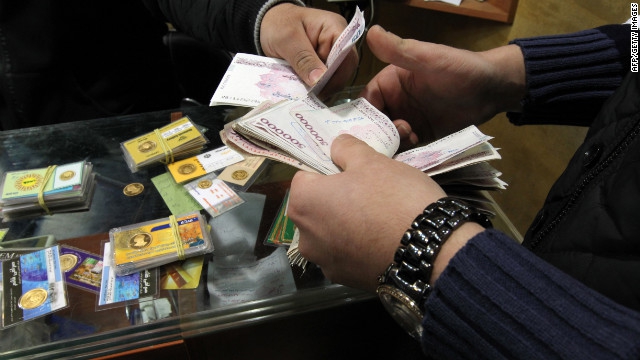Saturday 27 October 2012 - 11:24
Story Code : 8797
Iran currency traders face pressures, operate underground
TEHRAN � Ahmad, a 45-year-old conservative Iranian, saw his business brought to an abrupt halt when his Tehran shop was sealed off by state authorities recently.
A currency trader for 20 years, Ahmad has continued to operate underground, although his daily trade has slowed to a trickle.
Pacing the street by his shuttered shop in downtown Tehran, he waits for customers to call him on his mobile telephone, while fretting about an impromptu visit by the police. �You can�t buy millions of dollars anymore, but you can still purchase about $100,000,� he says.
Like many other currency traders, Ahmad�s business is a victim of high-stakes geopolitics as much as domestic economic mismanagement. That combination led to the plunge in the value of the rial this month, and drove the police�to close down most currency exchanges.�Ahmad is lucky that he has not been arrested.
The move by the authorities curbed market fluctuations and has helped the central bank limit the foreign exchange market to about two dozen currency exchange shops in Tehran.
These operate under central bank license and sell only limited amounts of hard currencies at rates just below the black market.
One U.S. dollar now buys about 31,000 rials on the black market and 30,000 in licensed shops, while the official rate remains at 12,260. Before the crackdown, the rial was selling at about 40,000 on the open market.
Ahmad, who asks that his real name not be used, says he knows of at least 50 other traders who have faced closure in the main center of the currency market on Ferdowsi and Jomhuri-Eslami streets in downtown Tehran.
Like him, however, many are still doing some business, and they are sought after by Iranian businessmen and ordinary people in need of hard currency.
Ahmad says the main reasons behind the market crackdown are�the international sanctions on Iran, which are aimed at persuading Tehran to curb its nuclear program.
He says the shortage in hard currency is due to shrinking oil revenues following the E.U. oil embargo in force in July, as well as mounting obstacles to the transfer of foreign exchange income into the country because of U.S. banking sanctions.
�When the police intervene,� he says, �it means there is shortage of hard currency and the market has got out of control.�
But Ahmad also blames domestic factors for exacerbating the currency problems. He points to �some political hands in the market,� which exploit the sanctions and engineer deliberate depreciation of the national currency to boost their rial income.
Iran�s currency troubles have accentuated tensions between President Mahmoud Ahmadinejad and a generally hostile parliament.
Ahmadinejad has accused speculators of being behind the rial�s sharp decline.
Iran�s parliamentarians, however, have accused the government of not only failing to curb the currency market but also of selling hard currency at higher rates in order to fund its populist policies.
Iran�s parliament this week revised the budget law to prevent any such exploitation and banned the government from using the differences between official and market currency rates to meet its rial expenditures. The government denies the allegations.
Despite the unprecedented economic pressure, the Islamic regime insists the country is still able to withstand sanctions and will not halt its nuclear program under any condition.
�As long as the [political and economic] conditions remain like this and sanctions continue, we would not be allowed to open our shops,� Ahmad says. �It is not possible to go back to normality in the foreseeable future.�
The risks associated with transactions to overseas recipients � whether businessmen or relatives � have also increased sharply, he says, because many currency dealers outside the country who are linked to Tehran dealers have gone bankrupt due to rial fluctuations.
�They do not admit bankruptcy, but we know that is why some big transactions disappear.�
Despite the risks, Ahmad still uses hawala, an old financial transfer system. It relies on trusted intermediaries to skip the conventional banking system, through which no money can be transferred due to sanctions. He sends his hawalas to Turkey, which he thinks is safer than Dubai, where, he says, an increasing number of transactions are going missing.
Ahmad says demands for hawala have decreased amid the deteriorating economy. The fall in the purchasing power of many families means they are less able to travel abroad or support their children�s� education overseas.
�Many families who used to buy hard currencies from us now tell their children to either come back from Malaysia, Australia and Europe or earn your own money if you wish to stay,� he says.
�A family which used to transfer �5,000 once in a while now can send �1,000, or a family which used to buy [Malaysia�s] ringgit at 2,200 rials cannot afford ringgit at 12,000 rials now.�
The Iran Project is not responsible for the content of quoted articles.
# Tags











